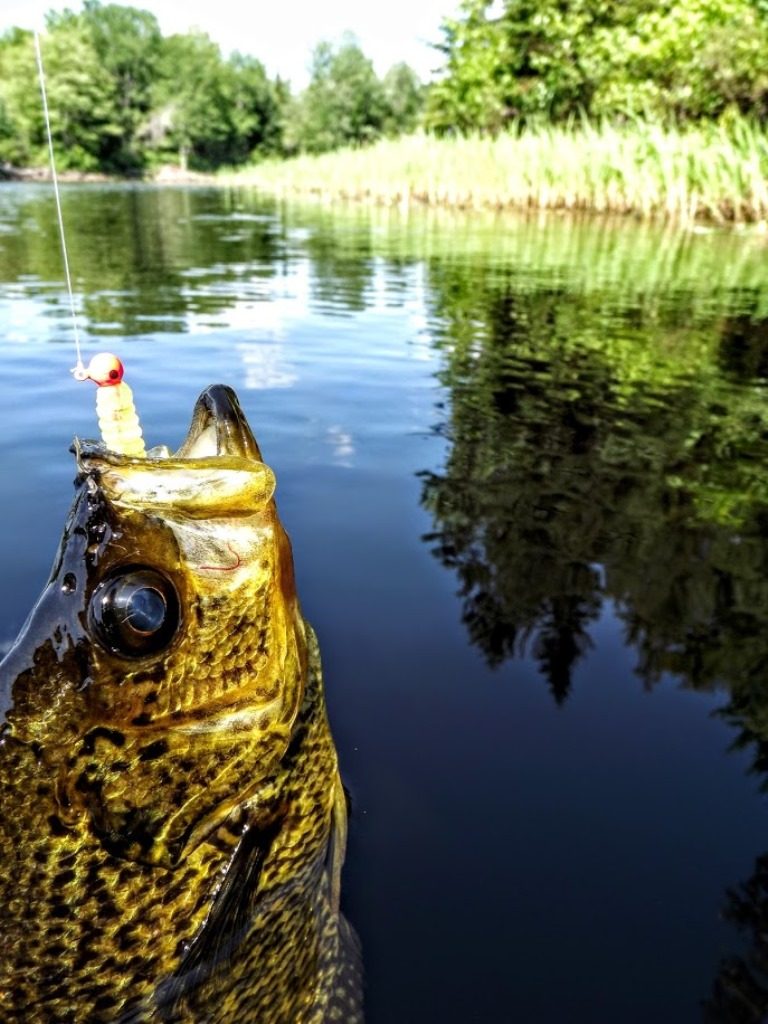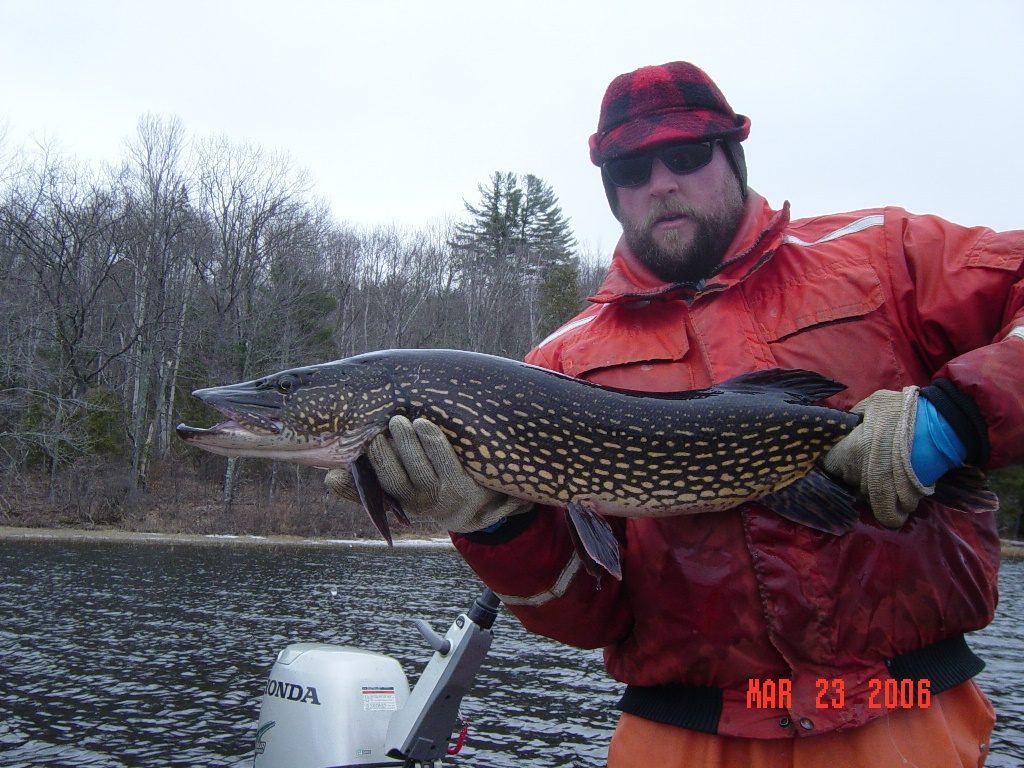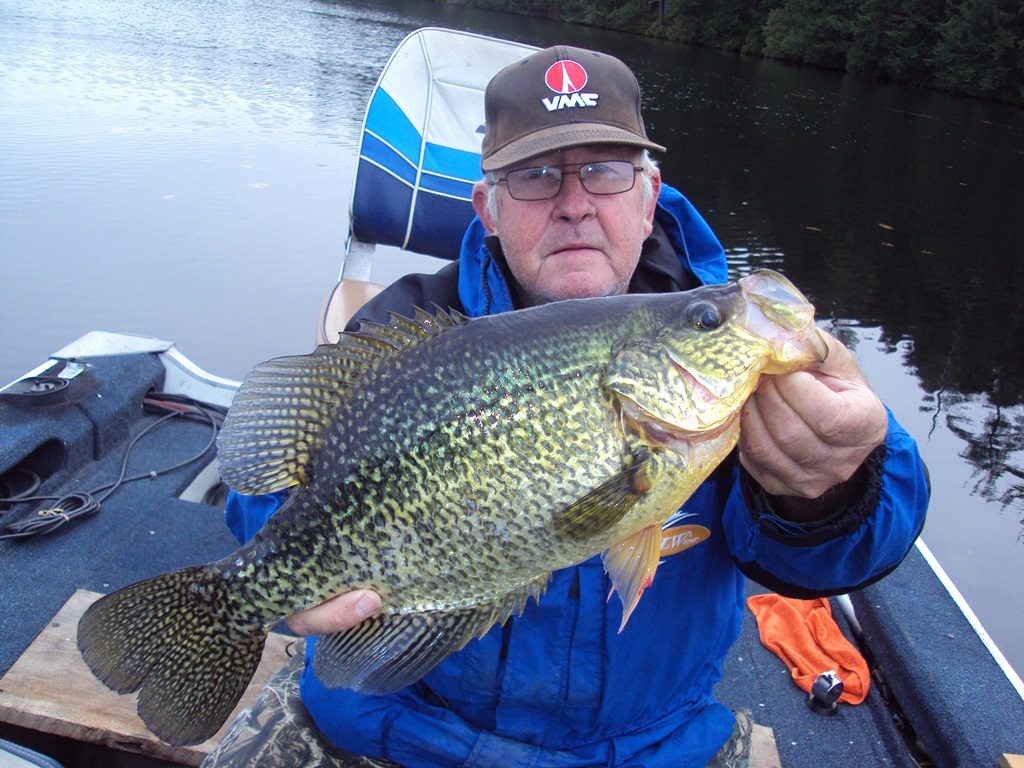September 30, 2016 at 12:34 pm
[caption id="attachment_1975" align="alignright" width="532"] Warmwater invasive species such as this crappie can outcompete native species[/caption]
By Wes Ashe, IFW Fisheries Biologist
Working in the Belgrade Lakes Region (Region B), it’s not unusual to get weekly calls with reports of new introductions of invasive/exotic fish species. Some of these reports turn out to be false, but unfortunately, many are accurate. The cast of invading characters is long. In the recent past, it has included smallmouth bass, largemouth bass, black crappie, northern pike, bluegill, white catfish, walleye, landlocked alewives, goldfish, and koi. We even had a report of snakeheads a few years back. Fortunately, that one turned out to be a hoax.
From largemouth to koi, all of these fishes are tough cookies. Most are extremely tolerant of warm and cold temperatures, low dissolved oxygen levels, and rapid water fluctuations. These exotics will eat just about anything, consuming zooplankton, insects, snails, fish, birds, and even small mammals. The vast majority are also cannibalistic. Nearly all of these fishes are incredibly prolific. They can successfully spawn in most central Maine waters, and they reproduce by the thousands. In doing so, they are able to compete with, prey upon, and greatly impact native Maine fish populations. Like destructive aliens from another planet, these invasive fishes are wreaking havoc on native brook trout, salmon, and even sunfish.
Prevention is the best defense against invasives since once they are introduced, they are able to propagate throughout the pond, lake, drainage, and/or watershed well in advance of their reported presence. By the time we are notified or have discover the invasive species they are often well established and multiple generations may already be present. In some instances, if the pond is small, lacks inlets and outlets, and doesn’t have a whole mess of dense vegetation growing along its perimeter; we might be able to eradicate the invasive fish species using a biodegradable chemical reclamation procedure. However, reclamations are expensive, are strictly regulated, and are only achievable in certain circumstances.
[caption id="attachment_1976" align="alignleft" width="591"]
Warmwater invasive species such as this crappie can outcompete native species[/caption]
By Wes Ashe, IFW Fisheries Biologist
Working in the Belgrade Lakes Region (Region B), it’s not unusual to get weekly calls with reports of new introductions of invasive/exotic fish species. Some of these reports turn out to be false, but unfortunately, many are accurate. The cast of invading characters is long. In the recent past, it has included smallmouth bass, largemouth bass, black crappie, northern pike, bluegill, white catfish, walleye, landlocked alewives, goldfish, and koi. We even had a report of snakeheads a few years back. Fortunately, that one turned out to be a hoax.
From largemouth to koi, all of these fishes are tough cookies. Most are extremely tolerant of warm and cold temperatures, low dissolved oxygen levels, and rapid water fluctuations. These exotics will eat just about anything, consuming zooplankton, insects, snails, fish, birds, and even small mammals. The vast majority are also cannibalistic. Nearly all of these fishes are incredibly prolific. They can successfully spawn in most central Maine waters, and they reproduce by the thousands. In doing so, they are able to compete with, prey upon, and greatly impact native Maine fish populations. Like destructive aliens from another planet, these invasive fishes are wreaking havoc on native brook trout, salmon, and even sunfish.
Prevention is the best defense against invasives since once they are introduced, they are able to propagate throughout the pond, lake, drainage, and/or watershed well in advance of their reported presence. By the time we are notified or have discover the invasive species they are often well established and multiple generations may already be present. In some instances, if the pond is small, lacks inlets and outlets, and doesn’t have a whole mess of dense vegetation growing along its perimeter; we might be able to eradicate the invasive fish species using a biodegradable chemical reclamation procedure. However, reclamations are expensive, are strictly regulated, and are only achievable in certain circumstances.
[caption id="attachment_1976" align="alignleft" width="591"] Northern pike have a voracious appetite.[/caption]
Every time a new illegal introduction is confirmed, the impacts and possible solutions are thoroughly explored. Each scenario is unique and factors such as the species introduced, the water body, the current species assemblage, and the location and potential for expansion throughout the drainage are all considered. Since complete eradication is not always feasible, methods aimed at controlling the new population are often explored but with more limited effectiveness. Maine IF&W takes these problems very seriously and invests time and resources into the fight against illegal fish introductions. Over the past six years we have completed eight large scale chemical reclamations and even have a representative serving on the American Fisheries Society- Fish Management Chemicals Committee. This group represents and advises fish and wildlife agencies across the country in the use of chemical reclamation to control or eradicate fish species.
The truth is, we can’t do this alone. The best line of defense is an informed public. Never introduce any kind of fish to a body of water, no matter what. The impacts could change the ecology of an entire watershed forever (not to mention the fact that you could be nailed with a $10,000 fine!)
If you catch a fish that seems out of place for the waterbody you are fishing (pike, crappie, etc), please either keep the fish or take a picture and contact the Fisheries Division immediately by calling your local regional office (contact information can be found in the fishing law book), or the Augusta Headquarters at (207) 287-8000. If you see someone keeping live fish, let us know, and if you wish to remain anonymous, there is a way to do that, while still doing the right thing. Call Operation Game Thief at 1-800-ALERT US (1-800-253-7887).
Maine is fortunate to have some unique and fantastic fisheries. Let’s work together to keep them that way.
Northern pike have a voracious appetite.[/caption]
Every time a new illegal introduction is confirmed, the impacts and possible solutions are thoroughly explored. Each scenario is unique and factors such as the species introduced, the water body, the current species assemblage, and the location and potential for expansion throughout the drainage are all considered. Since complete eradication is not always feasible, methods aimed at controlling the new population are often explored but with more limited effectiveness. Maine IF&W takes these problems very seriously and invests time and resources into the fight against illegal fish introductions. Over the past six years we have completed eight large scale chemical reclamations and even have a representative serving on the American Fisheries Society- Fish Management Chemicals Committee. This group represents and advises fish and wildlife agencies across the country in the use of chemical reclamation to control or eradicate fish species.
The truth is, we can’t do this alone. The best line of defense is an informed public. Never introduce any kind of fish to a body of water, no matter what. The impacts could change the ecology of an entire watershed forever (not to mention the fact that you could be nailed with a $10,000 fine!)
If you catch a fish that seems out of place for the waterbody you are fishing (pike, crappie, etc), please either keep the fish or take a picture and contact the Fisheries Division immediately by calling your local regional office (contact information can be found in the fishing law book), or the Augusta Headquarters at (207) 287-8000. If you see someone keeping live fish, let us know, and if you wish to remain anonymous, there is a way to do that, while still doing the right thing. Call Operation Game Thief at 1-800-ALERT US (1-800-253-7887).
Maine is fortunate to have some unique and fantastic fisheries. Let’s work together to keep them that way.
 Warmwater invasive species such as this crappie can outcompete native species[/caption]
By Wes Ashe, IFW Fisheries Biologist
Working in the Belgrade Lakes Region (Region B), it’s not unusual to get weekly calls with reports of new introductions of invasive/exotic fish species. Some of these reports turn out to be false, but unfortunately, many are accurate. The cast of invading characters is long. In the recent past, it has included smallmouth bass, largemouth bass, black crappie, northern pike, bluegill, white catfish, walleye, landlocked alewives, goldfish, and koi. We even had a report of snakeheads a few years back. Fortunately, that one turned out to be a hoax.
From largemouth to koi, all of these fishes are tough cookies. Most are extremely tolerant of warm and cold temperatures, low dissolved oxygen levels, and rapid water fluctuations. These exotics will eat just about anything, consuming zooplankton, insects, snails, fish, birds, and even small mammals. The vast majority are also cannibalistic. Nearly all of these fishes are incredibly prolific. They can successfully spawn in most central Maine waters, and they reproduce by the thousands. In doing so, they are able to compete with, prey upon, and greatly impact native Maine fish populations. Like destructive aliens from another planet, these invasive fishes are wreaking havoc on native brook trout, salmon, and even sunfish.
Prevention is the best defense against invasives since once they are introduced, they are able to propagate throughout the pond, lake, drainage, and/or watershed well in advance of their reported presence. By the time we are notified or have discover the invasive species they are often well established and multiple generations may already be present. In some instances, if the pond is small, lacks inlets and outlets, and doesn’t have a whole mess of dense vegetation growing along its perimeter; we might be able to eradicate the invasive fish species using a biodegradable chemical reclamation procedure. However, reclamations are expensive, are strictly regulated, and are only achievable in certain circumstances.
[caption id="attachment_1976" align="alignleft" width="591"]
Warmwater invasive species such as this crappie can outcompete native species[/caption]
By Wes Ashe, IFW Fisheries Biologist
Working in the Belgrade Lakes Region (Region B), it’s not unusual to get weekly calls with reports of new introductions of invasive/exotic fish species. Some of these reports turn out to be false, but unfortunately, many are accurate. The cast of invading characters is long. In the recent past, it has included smallmouth bass, largemouth bass, black crappie, northern pike, bluegill, white catfish, walleye, landlocked alewives, goldfish, and koi. We even had a report of snakeheads a few years back. Fortunately, that one turned out to be a hoax.
From largemouth to koi, all of these fishes are tough cookies. Most are extremely tolerant of warm and cold temperatures, low dissolved oxygen levels, and rapid water fluctuations. These exotics will eat just about anything, consuming zooplankton, insects, snails, fish, birds, and even small mammals. The vast majority are also cannibalistic. Nearly all of these fishes are incredibly prolific. They can successfully spawn in most central Maine waters, and they reproduce by the thousands. In doing so, they are able to compete with, prey upon, and greatly impact native Maine fish populations. Like destructive aliens from another planet, these invasive fishes are wreaking havoc on native brook trout, salmon, and even sunfish.
Prevention is the best defense against invasives since once they are introduced, they are able to propagate throughout the pond, lake, drainage, and/or watershed well in advance of their reported presence. By the time we are notified or have discover the invasive species they are often well established and multiple generations may already be present. In some instances, if the pond is small, lacks inlets and outlets, and doesn’t have a whole mess of dense vegetation growing along its perimeter; we might be able to eradicate the invasive fish species using a biodegradable chemical reclamation procedure. However, reclamations are expensive, are strictly regulated, and are only achievable in certain circumstances.
[caption id="attachment_1976" align="alignleft" width="591"] Northern pike have a voracious appetite.[/caption]
Every time a new illegal introduction is confirmed, the impacts and possible solutions are thoroughly explored. Each scenario is unique and factors such as the species introduced, the water body, the current species assemblage, and the location and potential for expansion throughout the drainage are all considered. Since complete eradication is not always feasible, methods aimed at controlling the new population are often explored but with more limited effectiveness. Maine IF&W takes these problems very seriously and invests time and resources into the fight against illegal fish introductions. Over the past six years we have completed eight large scale chemical reclamations and even have a representative serving on the American Fisheries Society- Fish Management Chemicals Committee. This group represents and advises fish and wildlife agencies across the country in the use of chemical reclamation to control or eradicate fish species.
The truth is, we can’t do this alone. The best line of defense is an informed public. Never introduce any kind of fish to a body of water, no matter what. The impacts could change the ecology of an entire watershed forever (not to mention the fact that you could be nailed with a $10,000 fine!)
If you catch a fish that seems out of place for the waterbody you are fishing (pike, crappie, etc), please either keep the fish or take a picture and contact the Fisheries Division immediately by calling your local regional office (contact information can be found in the fishing law book), or the Augusta Headquarters at (207) 287-8000. If you see someone keeping live fish, let us know, and if you wish to remain anonymous, there is a way to do that, while still doing the right thing. Call Operation Game Thief at 1-800-ALERT US (1-800-253-7887).
Maine is fortunate to have some unique and fantastic fisheries. Let’s work together to keep them that way.
Northern pike have a voracious appetite.[/caption]
Every time a new illegal introduction is confirmed, the impacts and possible solutions are thoroughly explored. Each scenario is unique and factors such as the species introduced, the water body, the current species assemblage, and the location and potential for expansion throughout the drainage are all considered. Since complete eradication is not always feasible, methods aimed at controlling the new population are often explored but with more limited effectiveness. Maine IF&W takes these problems very seriously and invests time and resources into the fight against illegal fish introductions. Over the past six years we have completed eight large scale chemical reclamations and even have a representative serving on the American Fisheries Society- Fish Management Chemicals Committee. This group represents and advises fish and wildlife agencies across the country in the use of chemical reclamation to control or eradicate fish species.
The truth is, we can’t do this alone. The best line of defense is an informed public. Never introduce any kind of fish to a body of water, no matter what. The impacts could change the ecology of an entire watershed forever (not to mention the fact that you could be nailed with a $10,000 fine!)
If you catch a fish that seems out of place for the waterbody you are fishing (pike, crappie, etc), please either keep the fish or take a picture and contact the Fisheries Division immediately by calling your local regional office (contact information can be found in the fishing law book), or the Augusta Headquarters at (207) 287-8000. If you see someone keeping live fish, let us know, and if you wish to remain anonymous, there is a way to do that, while still doing the right thing. Call Operation Game Thief at 1-800-ALERT US (1-800-253-7887).
Maine is fortunate to have some unique and fantastic fisheries. Let’s work together to keep them that way.